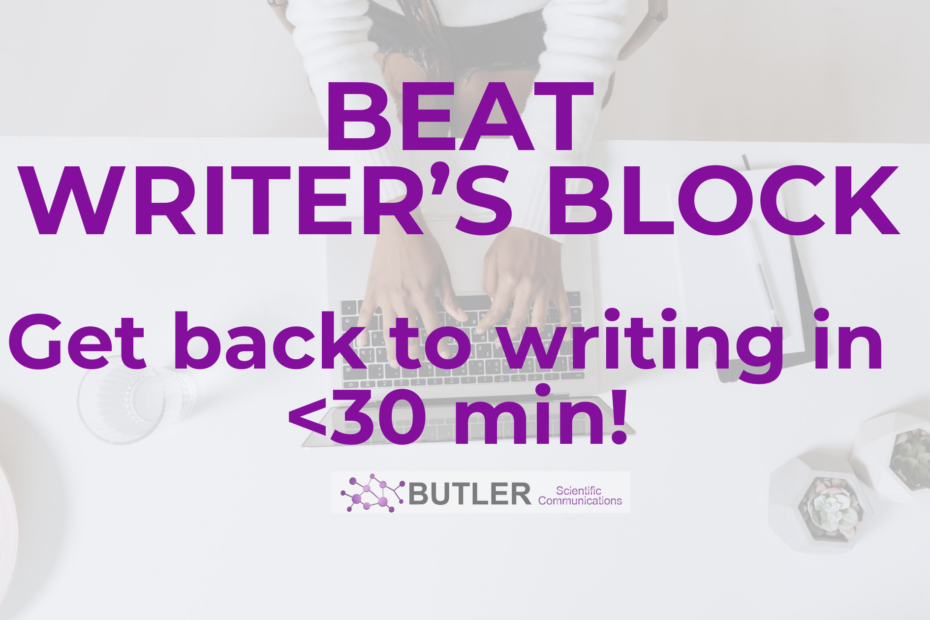Writer’s block is a complicated issue that stems from causes ranging from basic procrastination to not taking the time to establish healthy writing habits.
This second post in our writer’s block series gives 7 tips to overcome writer’s block by helping you keep your focus on your writing project and giving your brain the space it needs to process ideas.
More importantly, all can be implemented in less than 30 minutes, which you’ll consider time well spent once the words start flowing!
If you are instead struggling with procrastination or taking your draft too seriously, check our our first post of 8 tips addressing this, all of which can be done in <1 min!
Watch this as a video
1. Block all distractions (phone, computer, space!)
If you are struggling to keep your focus on your document, don’t give your brain the option of going elsewhere.
Instead, block all distractions in your physical space and on your phone and computer!

You will want to choose ways of blocking distractions that help you stay away from everything that can distract you or move your attention away from your writing task. This means blocking any websites or apps that might send you a notification or that you might pick up “just for a minute” (is it ever just a minute?)
How I do it:
In my personal space, I have an office with a door that closes to keep out distractions and signal to everyone I am writing (so they can’t bother me!) If you can’t do this, try going somewhere no one can find you – a hidden corner of the library or a coffee shop where you’ll be just another face in the crowd!
On my phone, I use the Samsung Modes and Routines function to AUTOMATICALLY put my phone into airplane mode and do not disturb during my SCHEDULED writing times – I don’t even have to think about it any more! Bonus: If I’m not writing during my scheduled writing times, my phone shuts down on me anyways!
On my computer, I use Forest, which forces me to stay off of distracting sites during my work time (or my forest won’t grow!), but doesn’t shut down the internet entirely. This allows me to look up anything I need, but prevents me from clicking over to distracting sites (even for “just a minute while I think”). I also use the Limit Google chrome extension that enforces daily limits for how long I can spend on any distracting site.
Here you will want to take the time to set up systems that work for you. For instance, I never receive urgent phone calls, so I can block everything from my phone. However, you might need to make sure calls from your kid’s day care get through.
If my suggested blocks don’t work for you or your phone doesn’t have the same functions, there are countless apps and productivity managers out there. Find ones that work for you and apply them consistently to keep your focus on the task at hand and help overcome your writer’s block!
Overcome writer's block in <30 min, tip #1: Before a writing session, BLOCK ALL distracting sites, apps, and notifications on phone and computer. Even better - make it automatic (ie, scheduled for your blocked-off writing times) for no excuses!
Kaycie at ButlerSciComm Tweet
2. Try a writing-tangent exercise to get juices flowing
Sometimes we get stuck because we can’t get into the right mindset.
This usually happens to me closer to the beginning of a writing session, and the best fix is to allow myself to re-read and make edits to the text I wrote the day before. Once I start reading and getting into the flow of the text, it is much easier to continue on with writing when I reach the end of what I’d written previously.
Overall, the point here is to not let yourself get stuck in this mindset of “writing is writing and nothing else.”
While writing does eventually require getting NEW words on paper, we can overcome a high activation barrier by doing writing-tangent tasks that still further our project.
Next time you are stuck and need to overcome writer’s block, try to find what writing-tangent tasks might help you get in the mindset. That might be re-reading text, but it might also be reviewing your notes, jotting down an outline, brainstorming ideas for the day, etc.
The point here is to find a way to ease yourself into writing using a technique that works consistently for you.
Overcome writer's block in <30 min, tip #2: Beat the high activation barrier to writing by starting your session with some WRITING-TANGENT ACTIVITIES that get the juices flowing! Brainstorm, outline, re-read written text, review notes, and THEN write!
Kaycie at ButlerSciComm Tweet
3. Take a break

Yes, I mentioned this as part of the Pomodoro technique in a previous point, but it is important enough for overcoming writer’s block to mention again for those not using timed writing chunks.
If you are struggling to write, assess your situation – have you been writing for a long period of time? Many days in a row? Maybe few paragraphs in a row?
If yes to any of these, ask yourself if you need a break.
And hey, if you aren’t writing anyways because you are struggling, a break won’t hurt!
Often, we just overload ourselves, work too hard, and aren’t nice enough to our brains in return.
If you are really struggling, try taking a break.
This means step away from all mental tasks to refresh your tea, do a few stretches, or scratch your cat.
You’ll be surprised what your brain can do when it gets the down time it needs!
Overcome writer's block in <30 min, tip #3: Writing is a brain-intensive process that takes a lot of recovery. If you are struggling, try taking a BREAK and returning to your document with fresh eyes!
Kaycie at ButlerSciComm Tweet
4. Take a shower or a walk
Have you ever heard of shower thoughts? You know, those ideas that just pop into your head when you are doing some unrelated and mundane activity?
They are a thing for a reason!
And finding ways to generate new or different ideas can work wonders for overcoming writer’s block.

When we do these common activities that we’ve done so often we can go on autopilot…
it frees up our brain to do its thing – process!
So if you are stuck trying to think of where to go next in your writing, stop TRYING to think and instead do something mundane.
Take a shower.
Take a walk and get out in nature. (There’s a reason Steven King swears by this for writing!)
Wash the dishes.
Pick any mundane task that you can do on muscle-memory alone.
And, even more importantly, don’t try to consciously direct your brain or force connections. Give your thinking mind a break and let your creativity work in the background!
Overcome writer's block in <30 min, tip #4: Shower thoughts are a thing! Step away from your desk and into the SHOWER. Let a mundane activity you can do on autopilot occupy your body while your brain churns in the background and see what pops out!
Kaycie at ButlerSciComm Tweet
5. Use a body double
Making the rounds due to its ability to aid those struggling to accomplish tasks with ADHD, body doubling is a technique in which you and another person agree to basically provide accountability for each other while working on your individual tasks.
Just having another person there, either in person or over a video call, is often sufficient for encouraging dedicated working time and might be just what you need to overcome writer’s block.
So what do you need to look for in a body double? Well, that’s easy – just another person who will sit quietly with you while you both work on your own independent tasks. That’s it.

This person could be a friend, colleague, partner, random person you bumped into at the library, or you could even sign up to a website that matches you with an online body double or allows you to join quiet working groups during your writing times (check out: https://www.flow.club/).
Wherever you find your body double, try to schedule your working times during your best writing times and ensure the next meeting is always already scheduled before you end your current session to make sure you always have something pulling you back to your writing.
Overcome writer's block in <30 min, tip #5: Generate ACCOUNTABILITY by scheduling side-by-side working time with a buddy! Pick a friend, colleague, or random person (www.flow.club) and sit together while working independently.
Kaycie at ButlerSciComm Tweet
6. Move to a new physical location

Sometimes, the staleness or stuck-ness in our writing and our brains can be solved by shaking up our environment.
Next time you are having trouble writing, try grabbing your laptop or pen/paper and taking yourself to a new location to overcome writer’s block.
Go find a quiet spot in the library.
Or a busier spot in your local coffee shop.
Or work at a friend’s house or in a co-working space or at a colleagues desk for the afternoon.
Wherever you pick, this new setting can often shake loose your ideas, awaken different senses, or give you enough of a mental break and movement getting there (and a caffeine jolt if you go to a cafe, like me!) to allow you to focus and write.
Overcome writer's block in <30 min, tip #6: Shake up your ENVIRONMENT. Take your laptop or pen/paper and go to a library, café, friend's house, or work at a colleague's desk for the day. Let new settings awaken different senses and shake words loose!
Kaycie at ButlerSciComm Tweet
7. Set a system of rewards/punishments
Rewards and punishments can be a great way to motivate yourself to get your writing done and can definitely be implemented to overcome writer’s block.
What is something you’ve been really wanting to have or do or someplace you want to go? Can you allow yourself to have or do that thing once you complete your project?
And then can you break that down? What is something you can give yourself as a little treat for, say, completing an entire week of steady work towards your project? What about for each day?
I know people that work really well with rewards, and some examples I’ve seen writers use successfully:
- Access to the “good” chocolate or ice cream
- Guilt-free time to do hobby for pleasure
- Allowance to spend on “fun” purchases for each completed writing session (even if its $1, it adds up! Thats the point!)
- Try a restaurant you’ve been wanting to go to after XX days of reaching goals
- Purchase something you’ve been wanting after finishing project
So – if you are struggling, brainstorm lists of things you could afford (money- and time-wise) to spend when you complete your project goals, and divide them into chunks of how often you would want to “gift yourself” those things.
For instance, any day I complete my required writing tasks, I will get a set amount of guilt-free time to spend on hobbies (at least 30 min every evening I write!), finishing each full week of work grants another week of “the good coffees”, and when I finish the project, I will gift myself a shopping trip to a favorite store – but the gift card will be held by a friend charged with keeping me accountable!
The rewards and punishments system is unique to each person and usually only has a temporary effect. So if your old rewards/punishments stop working, that doesn’t mean it never will again – you’ll just need to revisit the exercise. But if it helps motivate you, its worth taking the time for a short brainstorming session!
Overcome writer's block in <30 min, tip #7: Implement REWARDS & PUNISHMENTS. What can you "award" yourself for a good writing day? week? month? finished project? Also add "punishments" (give your prize to a friend if you skip) that push you to achieve your goals!
Kaycie at ButlerSciComm Tweet
Spread the love, share your methods!
Help us generate a library of possible strategies to bust writer’s block by telling us what helps YOU overcome your writer’s block.
Have some fun rewards and punishments that really motivate you? Share in the comments!
Know of a cool focus app or technique I didn’t mention? Send us a link in the comments!
And stay tuned for the next post in our series on establishing healthy writing habits!

